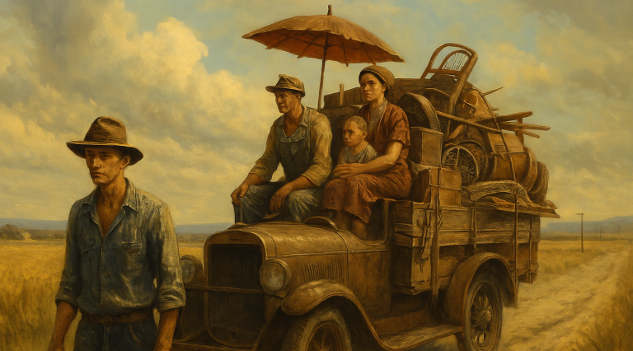
In This Article:
- What is partisan migration and how is it reshaping America?
- Do Americans really move based on politics?
- What makes extreme counties so attractive?
- How does this trend impact elections and democracy?
- Can anything reverse this growing political segregation?
How Partisan Migration Is Redrawing America’s Political Map
by Robert Jennings, InnerSelf.comThere was a time when people packed up their belongings and moved for practical reasons—better job prospects, lower cost of living, maybe even just to put some distance between themselves and meddling in-laws. Migration was largely about opportunity, stability, or lifestyle upgrades. But lately, a new motivator has crept into the equation: politics. Increasingly, Americans are choosing where to live not based on economic opportunity or climate, but on the prevailing political winds. Want to raise chickens in your backyard, fly a Gadsden flag, and never have to explain your Second Amendment bumper sticker? Rural Texas might be calling. Prefer organic co-ops, climate rallies, and streets named after civil rights leaders? Portland or Boulder are already halfway packed for you.
At first glance, this kind of ideological sorting might seem innocuous—even comforting. After all, who doesn’t want to feel a sense of belonging or shared values with their neighbors? But beneath the surface lies a deeply troubling trend: America is increasingly carving itself into clusters of political sameness. These aren't just cultural preferences—they're becoming full-blown echo chambers, where exposure to differing opinions is not just rare, it's avoided. The result is a country that still shares borders and a flag but is rapidly losing its shared reality. When we only live, shop, and socialize with people who vote like us, democracy doesn’t just suffer—it begins to erode from the inside out.
We’re Sorting Ourselves By Beliefs
According to a study by Liu, Andris, and Desmarais, migration from 2002 to 2015 shows a striking trend: people are more likely to move between counties that share similar partisan leanings. Extreme Republican counties attract other conservatives. Deep-blue Democratic counties draw in progressives. Moderates? They’re the political equivalent of single socks in the laundry—lost in the shuffle.
The research dives deep into county-to-county migration patterns and reveals what should be a national red flag: the most politically extreme counties aren’t just staying that way—they’re becoming even more entrenched by attracting people who think exactly like them. And who’s leaving those moderate, mixed-ideology counties? Everyone. Apparently, tolerating your neighbor’s opinion is so 1990s.
The Homophily Effect
Psychologists have a term for this: homophily. It means people like being around others who think, act, and vote like they do. This isn’t new—we’ve always had neighborhood churches and community centers filled with the like-minded. But now, this tribal instinct has taken over something as significant as where we choose to live, raise families, and build lives.
It’s the most extreme partisans—on both sides—who are the most mobile and the most likely to relocate to echo chambers. They aren’t just clustering in ideological bubbles; they’re reinforcing them. Think of it like adding bricks to the Berlin Wall of American polarization—except in this case, we’re the ones building it, one moving van at a time.
What This Means for Representation and Democracy
If you think this is just a sociological curiosity, think again. The U.S. Senate and Electoral College reward states, not people. So if deeply partisan voters cluster in low-population states, they get more political power per person. That’s how a country where the majority supports climate action, reproductive rights, and higher taxes on the wealthy ends up with political leadership that doesn’t.
This isn’t gerrymandering—it’s self-sorting. And it's worse, because you can't outlaw it. You can't legislate where people choose to live, and most people aren't moving with political consequences in mind. They're just looking for comfort, community, and confirmation bias. The result? A nation where swing districts vanish, consensus evaporates, and everyone thinks the other side has gone insane—because they never actually meet anyone from the other side anymore.
How Did We Get Here?
Once upon a time, the American dream meant living next door to someone who might disagree with you but shared your fence line. These days, it's more about finding a politically curated HOA. The network effect—the idea that people are drawn to places where their personal and professional networks already exist—is fueling this trend. And it’s not just political opinion. It’s jobs, schools, churches, dating apps. Even real estate prices reflect partisanship now.
Data shows that when people learn a neighborhood is politically aligned, they value it more. So yes, Republicans are willing to pay more to live around other Republicans, and Democrats feel safer with fellow Democrats. This is not diversity—it’s tribal loyalty masquerading as lifestyle preference.
Moderates Get Left Behind
What happens to those who don’t align perfectly with red or blue America? Well, the study suggests they’re increasingly adrift. Migration from moderate counties goes in both directions, meaning moderates are fueling the very polarization that will eventually leave them politically homeless. The centrists of America are becoming the squeezed middle—not just economically, but geographically and culturally too.
This creates a dangerous vacuum. Without a balancing force in the middle, political rhetoric gets louder, policymaking gets crueler, and the gap between realities widens. One side sees climate crisis; the other sees a hoax. One side sees racism; the other sees victim culture. With no moderates to bridge the gap, compromise dies, and democracy with it.
So, What Do We Do?
We could wax poetic about unity, but let’s be honest—there’s no app for rebuilding civic trust. And no, moving to another state isn’t a political solution; it’s a retreat. What we need is a cultural wake-up call. We need civic education, economic fairness, media literacy, and leaders willing to lose votes for telling hard truths. But most of all, we need courage—courage to stay put, to engage, and to live in communities where not everyone agrees with us.
Because if we don’t, partisan migration will keep pulling us apart until we become a loose federation of ideological tribes, flying the same flag but living in different countries. It won’t be a civil war—but it might be worse: a cold war of indifference, where each side watches the other collapse and shrugs.
So next time you move, ask yourself: am I looking for a better life—or just a louder echo?
About the Author
 Robert Jennings is the co-publisher of InnerSelf.com, a platform dedicated to empowering individuals and fostering a more connected, equitable world. A veteran of the U.S. Marine Corps and the U.S. Army, Robert draws on his diverse life experiences, from working in real estate and construction to building InnerSelf with his wife, Marie T. Russell, to bring a practical, grounded perspective to life’s challenges. Founded in 1996, InnerSelf.com shares insights to help people make informed, meaningful choices for themselves and the planet. More than 30 years later, InnerSelf continues to inspire clarity and empowerment.
Robert Jennings is the co-publisher of InnerSelf.com, a platform dedicated to empowering individuals and fostering a more connected, equitable world. A veteran of the U.S. Marine Corps and the U.S. Army, Robert draws on his diverse life experiences, from working in real estate and construction to building InnerSelf with his wife, Marie T. Russell, to bring a practical, grounded perspective to life’s challenges. Founded in 1996, InnerSelf.com shares insights to help people make informed, meaningful choices for themselves and the planet. More than 30 years later, InnerSelf continues to inspire clarity and empowerment.
Creative Commons 4.0
This article is licensed under a Creative Commons Attribution-Share Alike 4.0 License. Attribute the author Robert Jennings, InnerSelf.com. Link back to the article This article originally appeared on InnerSelf.com
Article Recap
Partisan migration is reshaping the political geography of the United States. As Americans seek ideologically aligned communities, political polarization deepens, moderate voices fade, and representative democracy becomes skewed. Research shows that this trend isn’t random—it’s a self-reinforcing mechanism powered by our desire for ideological comfort. The solution? A conscious effort to reconnect with those we disagree with, before it’s too late.
#PartisanMigration #PoliticalPolarization #RedVsBlue #MigrationTrends #CountyPolitics



